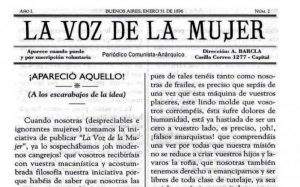
Argentina has been one of the most progressive feminist countries in recent years, as demonstrated by the rapid change of social norms. There have been social movements such as #AbortoLegal and #NiUnaMenos that women raised their voice to fight against patriarchy and the traditional gender roles while fighting for many rights. Women in Argentine history has a history of oppression, resistance and activism. We can trace these activisms since the second half of last 19th century when a group of anarchist-communist women started their magazine called “La Voz de La Mujer” in 1896, Buenos Aires, Argentina to fight against church oppression, children and women’s rights and labor oppression. In their very first publication, they said “we have decided to raise our voice and demand our part of pleasures in ‘the life concert.'” Their bravery started to challenge all the traditional roles that women were considered as incapable of being independent, and their destiny is to be domestic and caring. They could not inherit any properties, represent themselves legally or initiate divorce. However, with a series of feminist literature and education implementation, women started to fight against inequality.
For this research project, I would like to analyze how impactful at the end of 19th century to the start of 20th century in feminist social movement as a result of education and literature. I would like to argue that education and literature at the end of 19th century and start of 20th century set a foundation for Argentine women in fighting for their rights. First, it is important to analyze the role of education as an antecedent of the movement. In the 1870s, President Sarmiento made education at a national level and set up institutions to formalize. As well as making Spanish the official education language. Then, I will investigate how much accessibility women had gained from Sarmiento’s policy and how education changed them in careers and different fields. At the same time, I will compare the opportunities of men and women back in the second half of 19th century. Lastly, I would like to analyze important feminist literature such as “La Voz de La Mujer” and its influence in the development of feminism.
The primary sources could be original and official documents from the end of 19th century and start of 20th century. A possible resource could be the digital archives of “La Voz de La Mujer” from América Lee. http://americalee.cedinci.org/portfolio-items/la-voz-de-la-mujer/ The secondary sources would be gender studies presentations, scholarly articles and news paper articles.
Reference
Wu, Tongtong. “La percepción e interpretación del femicidio en Buenos Aires: Por qué la gente juzga diferente?” IFSA Global Flagship-Buenos Aires, published Dec 2 2018.
Sanchéz, Ana. “La primera edición de la voz de la mujer.” La izquierda diario, published Jan 9 2018, accessed Feb 4 2019. http://www.laizquierdadiario.com/La-primera-edicion-de-La-voz-de-la-mujer
Leave a Reply